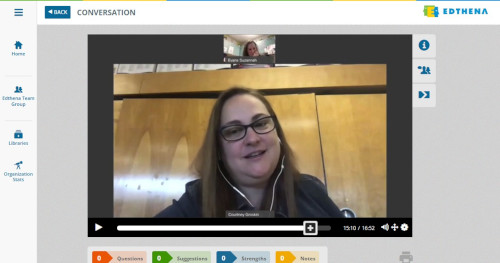When teachers and leaders have effective coaching, student outcomes inevitably improve. According to Rebecca Frazier, author of Coach Happy, coached teachers outperform non-coached teachers in 22 areas of instructional practice by four to five times.
Effective coaches must possess the ability to actively listen, decipher teachers’ needs, and build capacity based on the strengths of teachers. All of these skills take a huge amount of cognitive load for a coach and require intentional practice.
While some of these skills might be a little rusty after a summer off, the beginning of the school year is the perfect time to focus on coaching practices. Below are three ways for coaches to get started.
Elevating Practice with Meta Coaching
Meta coaching is a structure where the coach coaches the metacognition of another coach. During this process, the coach who is doing the meta coaching will observe another coach during an authentic coaching conversation.
When I had my first meta coaching conversation, the meta coach scripted all of my paraphrases. And, it wasn’t until then that I realized that my paraphrases were too long. This helped me to work on shortening my paraphrases down to a few words, which helped improve my coaching.
A meta coach can collect data during the coaching session in a number of ways, such as by scripting the paraphrases, questions, and responses of the coaches. When scripting a paraphrase, for example, the meta coach will jot down the paraphrase that is used so the coach can go back and analyze the paraphrases used during the conversation. Scripted questions can additionally help a coach reflect on the type of questions used, the content within the question, and the response elicited from the question.
Another example is documenting the time between pauses. Often, pauses feel really long during a coaching conversation when in reality they are much shorter. Having the ability to see the exact timing of how long the pauses are helps coaches get an idea of whether or not they need to leave more time for pausing during a conversation, which is important for allowing the coach time to think and listen. After the coaching session is done, the meta coach and coach can meet to engage in a reflecting conversation.
Here are some ways to start a meta coaching conversation: How did you feel about the conversation, and how did you make the decisions about paraphrases or questions used? What did you notice about the effect that your pause or paraphrase had? These questions can also be grounded in the data that was taken during the question.
Engaging in Deep Reflection with Video Coaching
Video reflection is a great way for coaches to refine their practice. Plus, it transcends the constraints of time and space, which can often provide logistical challenges.
If the teacher being coached agrees to being videotaped, coaches can set up an iPad, phone, or computer to record the coaching session, including the coaching conversations and interactions between the coach and the teacher. In St. Vrain, our coaches then use the video platform Edthena to upload and analyze the coaching session.
In addition to self-reflecting, Edthena allows the coach to share their video with a group of people. Each person in that group can watch the video and leave time-stamped feedback or ask questions about the coaching session. This is a great way to track pauses and paraphrases, mark cognitive shifts, and receive valuable feedback from colleagues.
The platform also saves the videos. This is especially beneficial so coaches can watch their coaching progression over a year or several years.
Participating in Peer Coaching
Educators and classroom teachers are used to collaborating with the teachers down the hall. However, there may only be one coach in a building–or possibly in the entire district. This can make coaching feel isolating.
Thankfully, there are several ways to collaborate. For districts with multiple coaches, try to get together to coach one another at least once a month. St. Vrain has made this a regular part of our coaches’ meetings and it has offered a great way for us to hone our skills while getting some coaching as well.
Twitter chats are another great way to share ideas and glean from others. For example, Kathy Perret hosts a regular Twitter chat for ICs every Wednesday night under #educoach. Coaches can hop in, see what others post, and then find other coaches to follow. It’s a supportive group that always has great insights and strategies to share.
For coaches who want to work intentionally to elevate their coaching practice, there are many classes available, such as the Cognitive Coaching Seminars®. This eight-day training is generally conducted over an 18- to 24-month period of time, and can be delivered in flexible formats depending on the needs of the agency. Student-Centered Coaching with Diane Sweeney is another option that introduces a new way of delivering instructional coaching that puts the needs of students front and center.
The St. Vrain Virtual Inter-District Coaching Collaborative, which is open for registration and kicks off this October, provides coaches the time and space to practice, reflect, and elevate coaching skill sets with other coaches as they receive re-licensure or graduate credit. Coaches will have the opportunity to practice building a sense of collective efficacy to increase their craftsmanship, consciousness, and efficacy in becoming mediators of thought, as well as to hear from coaching guests such as Kenneth McKee, Rebecca Frazier, and Jennifer Abrams.
Whichever way is chosen, it’s important for coaches to remember that coaching and skill development take practice. By remembering to go slow, listen actively for the request in every complaint, and assume positive intentions, coaches can better support and engage teachers in their important work.
- 4 ways to encourage play in education - April 25, 2024
- CoSN IT Leader Spotlight: Lisa Higgins - April 25, 2024
- It’s time to pay student teachers - April 25, 2024

